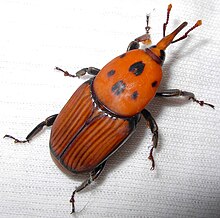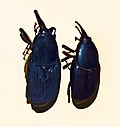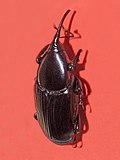Rhynchophorus
Genus of beetles From Wikipedia, the free encyclopedia
Rhynchophorus, or common name palm weevils, is a genus of beetles in the weevil family, Curculionidae. Palm weevils are major pests of various trees in the family Arecaceae throughout the tropics including: coconut (Cocos nucifera), Areca catechu, species of the genus Phoenix, and Metroxylon sagu.[3] Two species are invasive pests outside their native ranges, Rhynchophorus ferrugineus[4] and Rhynchophorus palmarum.[5]
| Rhynchophorus | |
|---|---|
 | |
| Rhynchophorus ferrugineus | |
| Scientific classification | |
| Domain: | Eukaryota |
| Kingdom: | Animalia |
| Phylum: | Arthropoda |
| Class: | Insecta |
| Order: | Coleoptera |
| Suborder: | Polyphaga |
| Infraorder: | Cucujiformia |
| Family: | Curculionidae |
| Subfamily: | Dryophthorinae |
| Tribe: | Rhynchophorini |
| Genus: | Rhynchophorus Herbst, 1795 |
| Species[1] | |
|
10 species; see text | |
| Synonyms | |
| |
Species
| Image | Common name | Scientific name | Native distribution |
|---|---|---|---|
 | black palm weevil | Rhynchophorus bilineatus (Montrouzier, 1857) | Moluccas, Papua New Guinea and Solomon Islands |
 | palmetto weevil | Rhynchophorus cruentatus (Fabricius, 1775) | Florida, but has been found as far as southern Texas to the west and South Carolina to the north. |
| Rhynchophorus distinctus Wattanapongsiri, 1966 | Kalimantan | ||
 | red palm weevil | Rhynchophorus ferrugineus (Olivier, 1790) (aka Calandra ferruginea (Fabricius, 1801)) | tropical Asia, Sri Lanka and the Philippines |
| Rhynchophorus labatus Ritsema, 1882 | Sumatra | ||
 | South American palm weevil | Rhynchophorus palmarum (Linnaeus, 1758) | Argentina to Paraguay and north through South and Central America to central Mexico and the Caribbean (Barbados, Dominica, Grenada, Guadeloupe, Martinique, Saint Lucia, Saint Vincent, Grenadines, Trinidad and Tobago, and perhaps Cuba, Dominican Republic, and Puerto Rico |
 | African palm weevil | Rhynchophorus phoenicis (Fabricius, 1801) | Senegal to Ethiopia and South Africa. |
| Rhynchophorus quadrangulus Quedenfeldt, 1888 | Cameroon | ||
| Rhynchophorus richteri Wattanapongsiri, 1966 | |||
 | Sago palm weevil | Rhynchophorus vulneratus (Panzer, 1798) | Indonesia, Malaysia, Myanmar, Singapore, and Thailand |
References
External links
Wikiwand - on
Seamless Wikipedia browsing. On steroids.
